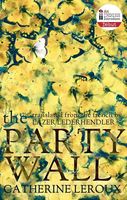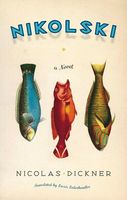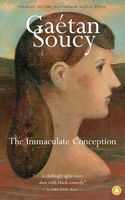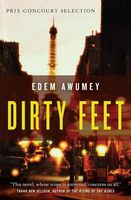Prizewinner / Prizefighter
By Koom Kankesan
I don't know how many people you personally know that have won more than one Governor General's Literary Award, but I know only one. His name is Lazer Lederhendler. A celebrated and much sought after translator, his work has won: seven Governor General's shortlistings, three Quebec Writers Federation awards, two Giller shortlistings (including one this past year), one CBC Canada Reads winner (2010), and of course the two GG wins (for Nikolski by Nicolas Dickner in 2008, and this past year for The Party Wall with Catherine Leroux). And those are just the accolades I know about.
I met Lazer fifteen years ago when I lived in Montreal. He's kind of like the rest of us: he wakes up in the morning, showers, puts his pants on one leg at a time, breakfasts, but then he sits down and knocks out Governor General's Award winning work. When I introduced Lazer to Ed Yanofsky years ago, they joked that they had met as kids in a boxing ring at the Y. There is something of the fighter about Lazer. He speaks in a scrappy interrogative patter. His eyes and face are restless, constantly searching, constantly thinking. Politics and the fate of the world have always been important subjects to him. He took time from his considerable workload to answer my questions.
Koom: Let me start with your recent Facebook post where you posted what you said when you recently accepted your Governor General's Literary Award. Can I get you to talk about that? What is it that you addressed and why did you feel the need to address it at the GG's?
Lazer: I think the best answers to your questions are in my GG acceptance speech, which, as you mention, anyone can see on my Translator page or on my personal page on Facebook. To put it in a nutshell, I juxtaposed my personal gladness at winning the award with my awareness of the terrible mess humanity, not to mention the planet, is in, with no one to blame but ourselves. Hence the need to speak out, to find the right words. I spoke to the enrolment and perversion of language (post-truth) to suit the needs of wealthy men hungry for power, while, inasmuch as literature is the creation of beauty—therefore truth (I quoted Keats's "Ode") through language, it can be a form of dissidence. I gave the example of "sharing," which has been twisted to signify a fierce variety of capitalism, whereas the enterprise and community called literature represents a far more generous sense of sharing.
You ask why I felt the need to address such issues at the GG. That's not a simple question, but for now I would point to the need to be true to oneself, which for me means not squandering an opportunity to speak my mind publicly about things that really matter rather than things that don't so much. The unspoken variable in Keats's equation is freedom (or as Layton put it, "if nothing else, poetry is freedom"), and freedom of expression is nothing if it is not exercised.
Koom: That's excellent. When I knew you in Montreal in the early 2000's, you were a very politically conscious person. Would you say you're just as politically minded now, or even more so? I was discussing the presidential election in a comics podcast with another person I've interviewed for this series (Kumar Sivasubramanian) and we were discussing a satirical near future sci-fi dystopia by Frank Miller called Give Me Liberty. I thought that the only reason that book was so strong in the early 90s was because the things that happened in it were outlandish compared to the political process and landscape of the time it was released. Now, it wouldn't work because our notion of what's acceptable has been pushed so far afield by new media, reality shows, the crossover between entertainment and politics, etc. Have you found it harder to remain politically conscious and act accordingly, given your growing success as a translator in the CanLit field?
Your CanLit News
Subscribe to Open Book’s newsletter to get local book events, literary content, writing tips, and more in your inbox
Lazer: Koom, Your question is open to various readings. E.g. Has my "growing success" gone to my head? Have I become cynical? Do I censor myself more? Have I sold out? To this line of questioning, the short answer is "no, I don't think so."
But let me try to unpack the question further. By "growing success as a translator etc." you're referring, I assume, to the small degree of celebrity that's come my way mainly because of some awards and the attendant (and ephemeral) media attention. Well, you know, such honours are very gratifying and flattering (and, yes, possibly destabilizing) but I try—by and large successfully—not to take either myself or the prizes too seriously (especially not the whole glam/showbiz paradigm).
That said, I feel there's a responsibility attached to celebrity, however minor and modest, a responsibility engendered by the very nature of celebrity: you are given a (usually very fleeting) moment in the spotlight, you are handed a mic, sometimes put on a stage, and asked what you think of this or that and, curiously, you see that some people (however few) are actually interested in what you have to say and so you feel part of a wider public conversation.
Most people never experience this and they're none the worse for it, on the contrary. But once you're in that situation, you have a choice to make: You can waste everyone's time—especially your own—spouting clichés and platitudes or, worse, pander to the perceived expectations and opinions of any given audience (because we all want to be loved, don't we) or, even worse, try to use your celebrity, such as it is, to aggrandize yourself or even exploit/dominate others.
On the other hand, you can use your proverbial fifteen minutes to perform a meaningful speech-act, i.e. speak your mind, speak from the heart, share your thoughts about the big issues we are all faced with these days, starting with the fate of the planet as a living organism, the future (or not) of homo sapiens and their civilizations.
To my mind, it's a matter of acting like a citizen, that is, someone with a stake in the world, with things to say and a voice to say them with. In fact, isn't that same impulse at the heart of social media and other such forums?
Koom: I do think that is at the heart of being a writer: truth, honesty, insight, character. Maybe a little beauty while you're at it. Yet so many writers I meet are poor communicators, exhibit such poor character, prevaricate in one way or another. Having a simple interaction or conversation with some can be torture to the point that you lose faith in the institution, if not humanity.
I wouldn't say I was asking if you'd sold out. Keeping your head straight, your balance, can be a challenge sometimes for even the best of us. That is the nature of life and humanity. But yes, let's change tacks. Given your profile as a translator, you must be able to some degree at least pick and choose the projects you take on. How do you go about picking and accepting a contract or a book to work on?
Lazer: I would say that over the past ten years or so I've been very lucky as a translator, insomuch as most of the projects that have been proposed to me originated with publishers (both of the original works and the translations) whose catalogues I'm attracted to as a reader. By the way, I think that, in general, it's a good idea for any reader to "follow the publisher."
However, I never accept a project without reading at least a representative portion (e.g. beginning, middle, end) of the proposed book and, if I'm not familiar with the author, doing some research on her or his work and bio. I need to feel a basic affinity with the writing as far as its aesthetics and ethics are concerned. I won't translate something that's odds with my basic values, for instance, one that puts forward a misogynist or racist worldview.
On the aesthetic level, beyond the essential criterion of "good writing," I look for a style and an approach that's fresh, unique, audacious and relatively free of stale sentences, stereotypes, clichés, and ready-made thinking. There are already more than enough unenlightening, mediocre (or worse) books being produced, and I have no wish to add another one to the pile. I guess that I'm an idealist in that regard; I believe in writing that challenges readers and invites them to explore unfamiliar territory.
Koom: Are there any great (as opposed to the day to day technical challenges) difficulties or challenges that come with translation? Do you miss the chance to work on your own writing for example? Does it lead to strange interactions with the original authors whose work you've translated?
Lazer: Not quite sure I understand your general question, so I'll address the examples you mention. Translation is my profession and my livelihood, it's not something I do while waiting for "the chance to work on my own writing." Translation is what my work as a writer mainly consists of. To put it another way, I am a writer specializing in translation, that is, a writer who is not an author. Whenever possible, I like to engage in other forms of writing (essays, articles, narrative fiction, poems, on-line interviews, etc.) but I don't "miss" them, don't yearn for them.
That said, I admit to previously (and still on occasion) indulging some authorial fantasies/ambitions, but I prefer to keep them under wraps until I have something concrete to share.
You ask about "strange interactions" with authors. One thing I like about being a translator is that you're necessarily involved in "the conversation" that literature is. Indeed, translation is quintessentially the, or at least a literary conversation. I can't think of many other interactions as strange as that. On another level, though, this speaks to the crucially social nature of all writing, translation in particular. If you're wondering about awkward or even unpleasant exchanges with authors I've translated, of course there have been some of those (no specifics—let's keep gossip to a minimum), as is true of anyone who has had to deal with various ego-heavy people (including oneself).
By and large, however, by far most of the authors of the books I've translated are not just smart and well-read but gracious, generous, broadminded people with whom I've generally established relationships of mutual respect and friendship.
The books pictured above have all been translated by Lazer. The author photo attached to this post was taken by Monique Dykstra.
The views expressed in the Writer-in-Residence blogs are those held by the authors and do not necessarily reflect the views of Open Book.
Koom Kankesan was born in Sri Lanka. While his family lived abroad, the civil war in Sri Lanka broke out and this caused them to seek a new home. They eventually settled in Canada and have lived here since the late eighties. He has a background in English Literature and Film Studies. Koom contributed arts journalism to various publications before becoming a high school teacher in the Toronto District School Board. Since working as a teacher, he has taken semesters off now and again to work on his fiction. The Tamil Dream, his new book, is his most ambitious to date. It looks at the end of the civil war in Sri Lanka and how it affected Tamils here in Canada. Besides literature and film, Koom has deep interests in history and science, and an enduring love for comic books.
You can write to Koom throughout January at writer@open-book.ca.






